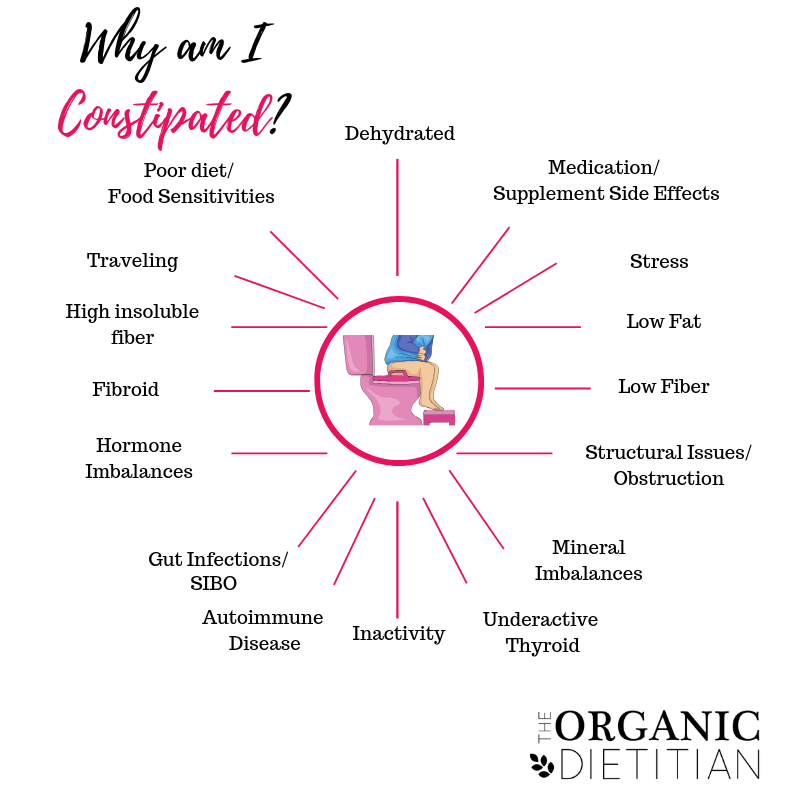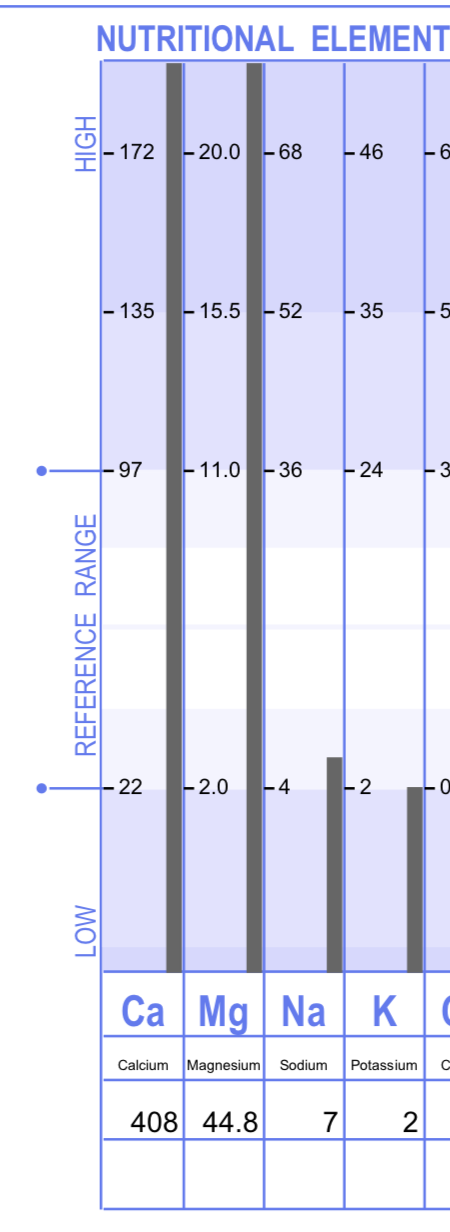27 April, 2020
Are mineral imbalances contributing to your constipation?

A large percentage of my clients come to me dealing with constipation and sometimes without even realizing they are constipated. If you are unsure, check out my post on the 10 Signs of a Healthy Poop. What most don’t realize is that minerals can play a role in constipation. So are mineral imbalances contributing to your constipation?
If you aren’t having a quality bowel movement at least once per day then you aren’t getting your toxins out and are more likely to have hormone imbalances like estrogen dominance (because excess hormones are one thing being eliminated in your stool) and gut issues. I have clients that are constipated their whole lives and end up with things like SIBO (small intestinal bacterial overgrowth). So yeah it is important to properly eliminate!
As you can see in the graphic below, there are numerous possibilities why someone may be constipated. The area that I am going to address today is how mineral imbalances can contribute to constipation.
In my practice I use hair trace mineral analysis (HTMA) as a tool to help clients balance their minerals. Minerals are the spark plugs of the body and are needed for thousands of processes in our bodies to function. Because we cannot make minerals we must get them through our diets but, unfortunately, our ground soils are more and more depleted. Then, add in that chronic stress can also create havoc in our bodies leading us to lose more minerals. And yes, stress tends to be a big problem in our modern society. Even hidden stressors, not always just mental or emotional.
Magnesium
Magnesium is definitely the most common mineral we think of when we think of constipation. Sometimes it is the first thing people try and for good reason. Magnesium helps relaxes muscle and since your digestive tract is one big muscle it makes a lot of sense.
Magnesium citrate is commonly used but it does tend to be a poorly absorbed form. We also have to remember that nutrition is a complex topic and isn’t always straight forward. There is a reason I had to go to school for four years and complete an internship to study the area of nutrition in the human body. Magnesium requires some cofactors to help our cells utilize it otherwise we tend to just loose it. I see this all the time on hair mineral tests! Clients taking magnesium yet still showing signs of magnesium deficiencies and sure enough magnesium is high on the HTMA test which indicates a loss. Nutrients like boron and vitamin B6 help magnesium stay in the cells. The other things to think about include the correct dosing and absorbable forms which will be highly individual.
Calcium and Potassium
The next minerals to consider are calcium and potassium. Calcium can slow the thyroid down yet potassium helps to speed up the thyroid. If these minerals are out of balance then you could be experiencing symptoms of a sluggish thyroid, one of them being constipation. A slow thyroid tends to slow down things like your digestive system. These are imbalances likely not seen on a typical blood test because blood is just a transport medium and doesn’t reflect what is happening inside our cells, which is why I prefer hair mineral testing. I observe a high calcium to potassium ratio in at least 80% of my clients. Things that can imbalance this ratio include emotional stress, improper supplementing of calcium or vitamin D, adrenal issues, iodine deficiency, copper toxicity, hard drinking water, and even thyroid issues themselves. Balancing these minerals should be geared to each individual. Also, it is important to be monitored through proper testing to make sure you are on the right track and adjustments can be made throughout the process.
Copper
Copper is another an essential mineral. The issue with copper is if the levels start to increase in the body then you could be dealing with copper toxicity. Many practitioners will tell you this is rare but, in my experience, it is much more common then we realize. More and more people are dealing with hidden copper toxicity; when the body starts to build up and store bio-unavailable copper in the body. So, it is basically there but our bodies can’t use it. The primary cause of copper deficiency in the body is hidden copper toxicity. Yes, you are right, I know that this sounds confusing.
We can become copper toxic in many ways. I love this flowchart. So how does this excess copper impact our bowels? Well guess what, copper issues can increase calcium and decrease potassium. That brings me to the issue above and how those two minerals out of balance can slow the thyroid down.
Iodine
Another mineral issue I see frequently is iodine deficiency. While it is a mineral that is more challenging to properly test there can be some signs and symptoms that could point to a deficiency. If a client is dealing with estrogen dominance, endometriosis, fibroids, cysts, thyroid issues, thyroid nodules or has high calcium on a HTMA test I think iodine. And guess what your thyroid needs iodine to work properly so if you have a deficiency then you can develop constipation as a result.
I do caution using an iodine supplementation because if you don’t know what you are doing or if you aren’t taking the proper tests to adjust your dose as needed to may end up taking too little, too much, or not taking the proper cofactors like selenium (for one). When using HTMA testing I may start someone low and slow but increase to a higher dose for a short period of time and then back off as certain minerals improve.
Minerals for constipation aren’t as straight forward as I know many were hoping for. As with most health-related topics it will be completely individualized to meet your needs and, sometimes,the needs will change over time. There is no one thing that will work for everyone so you have to find what works best for you.
What Can I Do?
The one thing you can do now to help support minerals is to work on reducing your stress. I like journaling, meditation, minimizing things that I know stress me out, say no more often, do more things I love, spend time with people that support me for who I am, and taking deep breaths. This is important to address because stress can deplete your body of minerals more quickly.
Another favorite of mine is to use quality salt in my diet every day. I love grey Celtic salt because it contains over 80 minerals the body needs (not necessarily in the right dose). It could be at least a start in the right direction with minerals.
Ultimately, I highly recommend being tested and not guessing to help determine if mineral imbalances are contributing to your constipation. The importance of providing each client I work a HTMA test allows me to make specific recommendations to help balance their minerals and work towards eliminating any symptom including constipation.
ARE YOU READY TO GET TESTED AND TURN YOUR HEALTH AROUND?
As a Registered Dietitian and Functional Diagnostic Nutrition Practitioner, my team and I help clients get proper testing, assist in the process of reading those results using clinical correlation (treating the patient and not just the test results), and give them the proper tools (diet, supplements, and lifestyle) to start the healing process.


















 80% of chronic dis-ease is rooted in stre
80% of chronic dis-ease is rooted in stre
 As
As 

This was a great article. I like how you broke down the minerals.